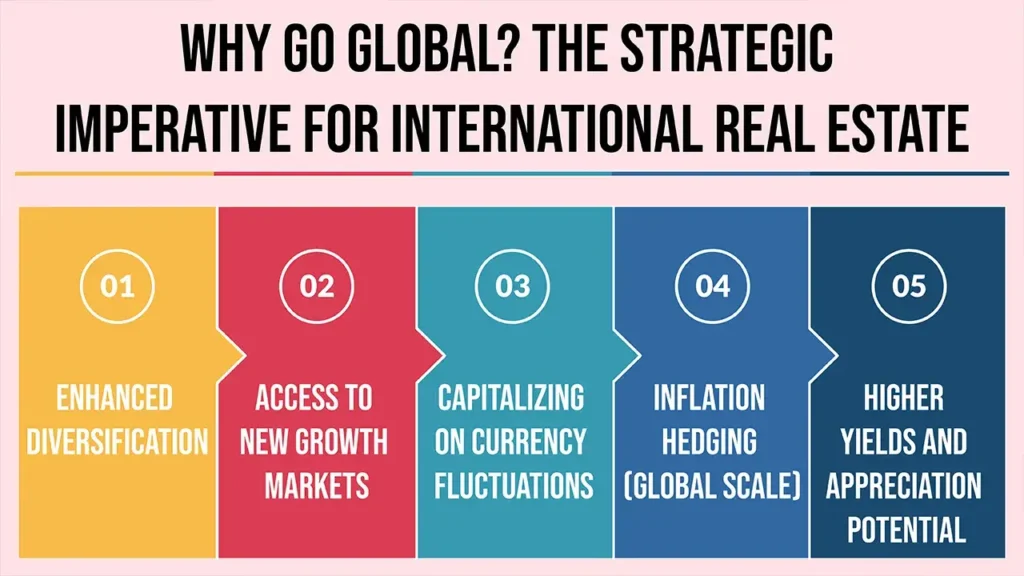Are you ready to move past borders with a Canadian virtual home for your real estate portfolio? Large real estate investments worldwide give you a world of opportunities you can use to improve your investment plan.
This article is for knowledgeable investors, HNW individuals, and capital allocators who are seeking opportunities outside of their local markets. We will also discuss the major advantages, challenges, tactics, and logistics of international real estate investments.
Why Go Global? The Strategic Imperative for International Real Estate

1. Enhanced Diversification
- Diversified Market Cycle Exposure: Various national real estate markets operate on their own economic cycles, which act as a strong hedge against one’s domestic market downturn. For instance, while a European market is weak, the Indian market may be strong and vice versa.
- Geographic Risk Mitigation: Diversification internationally mitigates concentration risk in any single economy or regulatory domain.
2. Access to New Growth Markets
Identify areas with potential for significant growth and up-and-coming economies or any demographic trends in a country that will result in larger returns than what you would have at home.
Some of these fortunes might find their footing in sectors or innovation hubs in foreign countries.
3. Capitalizing on Currency Fluctuations
A favourable exchange rate, upon entry or exit, can boost returns or contribute to additional income.
4. Inflation Hedging (Global Scale)
Values of property and of rents in different economies can serve as a hedge against inflation in diverse currency areas.
5. Higher Yields and Appreciation Potential
There might be some markets that provide better yields or capital growth than the home market, where it’s just very crowded.
Political and Economic Instability
Changes in government policies and macroeconomic instability (e.g., inflation, recession) may affect property values and rental revenues. Do some good due diligence on political stability and economic projections.”
1. Regulatory and Legal Differences
Differential ownership laws, taxes (local and international), zoning and inheritance laws and more can make for complex investment structures. Retaining local attorneys for this type of foreign investment is necessary.
2. Currency Risk
Negative currency moves can erode returns or add to costs. Think of FX hedging to hedge currency risks – or even consider exposing yourself to stable currencies or natural hedges (matching income/expenditure in the same currency).
3. Market Illiquidity
Real estate is typically an illiquid investment, and international markets even more so, particularly in less developed areas. A long-term investment horizon and good exit planning are important.
4. Taxation Challenges
Double taxation and capital gains, rental and property transfer taxes between two different countries can muddy your investment waters. Seeking out international tax advisors who can grasp your home country’s and target country’s tax laws is essential.
5. Cultural and Language Barriers
Communication can be challenged by cultural differences and not understanding local customs. Working with local authorities and linguists will help address these gaps.
6. Distance and Management
It’s tough to manage properties from a distance. Engaging with trusted local property managers or using passive vehicles can remove some of the overhead.
Strategies for International Real Estate Investments
Elite (Active & High Capital) Direct Ownership of the Asset
- Residential Assets: Purchasing flats, villas or houses for rental income or capital appreciation is a common investment in steady, high-demand cities (like London, Dubai, New York, Singapore, Lisbon)
- Commercial properties: Office buildings, retail space and industrial properties can bring in more returns but generally are more expensive to get into.
- Development Projects: Investing in a new build or redevelopment can potentially generate greater returns but is high risk with a longer time horizon.
- Direct Ownership Considerations: This approach involves having large amounts of capital, a deep understanding of local markets with active management (or management you can trust), and the ability to get through intricate legal and tax regulations.
Secondary & Second-Hand International Real Estate Exposure (Easier Bar and more Liquid)
- Global REITs: Investing in REITs that are traded on stock exchanges (publicly traded REITs) and own and manage properties all over the world (office buildings, shopping centres, hotels, apartments and so on) provides a high level of liquidity, the benefit of owning and managing properties in numerous countries and property sectors around the globe and professional management.
- Global Real Estate Mutual Funds/ETFs: Several funds invest in a diversified portfolio of international real estate companies and REITs for broad diversification and professional management.
- International Real Estate Crowdfunding/Syndications: Investing in large international projects through pooling in funds with other investors on platforms, investors are able to get access to higher value international deals and generate passive income.
Important Considerations for Investing in the International Real Estate Market
Define Your Investment Goals
Clearly define what you hope to achieve, be it capital appreciation, rental income, diversification or tax benefits.
Thorough Market Research:
- Macro Analysis: Research how the world’s economy is performing, geopolitical stability and large capital flows.
- Analysis of economies per country: Analysis: GDP growth, inflation, interest rates, and demographics towards investment-friendly policies.
- City/Region Insight: Delve into the local supply and demand, rental yield, infrastructure developments and property value trends.
Due Diligence on the Ground
Employ experienced agents, property managers, attorneys and accountants based in Japan. Wherever possible, you should view your target market and buildings.
Understand Tax Implications
Consult international tax specialists to help you through the double taxation treaties, capital gains tax, rental income tax, and the potential repatriation of dividends.
Secure Financing
Investigate possibilities of financing in the host country (domestic banks, foreign creditors) or use of home wealth.
Risk Management
Structuring currency hedges, managing political risk and planning exit strategies.
Exit Strategy Planning
Think about when and how you will ultimately unload the property (market conditions, tax considerations).
Case Studies and Emerging Markets (A Brief Review)
- Stable Markets: More traditional safe havens in the US, UK, and Germany are still key markets for long-term stability and relative liquidity, albeit potentially with less on offer in terms of returns.
- Growth Market: (e.g., Vietnam, Philippines) cities (in Latin America) or geographic areas (Eastern Europe) with higher growth but also carry higher risk.
- Specialized Niches: There are few global trends, with opportunities in student housing, senior living, logistics/warehouses and data centres, for example.
In Conclusion: The World is Your Real Estate Portfolio
So, to win at global real estate investment, you have to know the benefit of the strategy and the key steps to get it right. Not without its complexities, global real estate can – with good preparation, investigation and professional assistance – become a transformational aspect of your investment portfolio.
Call to Action
Discover our world of real estate investment insights! Talk to our team of overseas property experts for your consultation today and get your free cross-border investment checklist!
Frequently Asked Questions
What is the minimum global real estate investment amount?
That really depends on the strategy, but with some crowdfunding platforms you can get started with as little as a few thousand dollars.
Is it a good idea to invest in foreign property for safety?
Sure, there are some not-so-nice parts of the globe, but some homework and intelligent choices can help minimize the various risks.
So how do foreign property taxes work?
Depending on the country, international property taxes can include several taxes such as capital gains tax, rental income tax and property transfer taxes. You should consult with a tax advisor.

Leave a Reply